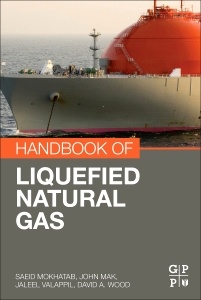Description
Handbook of Liquefied Natural Gas
Authors: Mokhatab Saeid, Mak John Y., Valappil Jaleel V., Wood David
Language: English
Subject for Handbook of Liquefied Natural Gas:
Keywords
advanced process control and optimization; commissioning; control and inspection; conventional and extended pinch analysis; design and operational benefits; distributed control system; effectiveness and profitability of an LNG operation; energy and exergy modeling; EPC contracts; fidelity and details of dynamic models; gas treatment; general startup sequence; industry practice and regulations; integrating NGL recovery and NGL units; liquefaction in cold climates; liquefaction technology; LNG characteristics; LNG environmental aspects; LNG facilities costs; LNG hazards; LNG lifecycle simulation; LNG plant and regasification operation; LNG risk analysis and controls; LNG security; LNG supply chains; LNG trade; monetizing stranded gas; natural gas liquefaction; NGL recovery and fractionation; nitrogen removal; onshore/offshore liquefaction processes; operator training simulators; performance and acceptance test; plant downtime and improved safety; plant information management system; process control and automation functionalities; process selection; project constructability program; project management sequence; quality assurance; refrigeration cycle principles; required compression work and COP; risk assessments; safety features of LNG facilities; shutdown procedure; small-scale liquefaction processes; technology verification; thermodynamic analysis
98.24 €
In Print (Delivery period: 14 days).
Add to cartSupport: Print on demand
Description
/li>Contents
/li>Readership
/li>Biography
/li>Comment
/li>
Liquefied natural gas (LNG) is a commercially attractive phase of the commodity that facilitates the efficient handling and transportation of natural gas around the world. The LNG industry, using technologies proven over decades of development, continues to expand its markets, diversify its supply chains and increase its share of the global natural gas trade. The Handbook of Liquefied Natural Gas is a timely book as the industry is currently developing new large sources of supply and the technologies have evolved in recent years to enable offshore infrastructure to develop and handle resources in more remote and harsher environments. It is the only book of its kind, covering the many aspects of the LNG supply chain from liquefaction to regasification by addressing the LNG industries? fundamentals and markets, as well as detailed engineering and design principles. A unique, well-documented, and forward-thinking work, this reference book provides an ideal platform for scientists, engineers, and other professionals involved in the LNG industry to gain a better understanding of the key basic and advanced topics relevant to LNG projects in operation and/or in planning and development.
1. LNG Fundamentals2. Feed Conditioning and NGL Recovery Technologies3. Natural Gas Liquefaction4. Energy and Exergy Analyses of Refrigeration/Liquefaction Cycles5. Natural Gas Liquefaction Cycle Enhancements and Optimization6. Process Control and Automation of LNG Plants7. LNG Plant and Regasification Terminal Operations8. Dynamic Simulation and Optimization of LNG Plants 9. LNG Safety and Security Aspects10. Advances and Innovations in LNG Industry11. LNG Project Management
Appendix1. An LNG Primer – Basic Facts and Myths Surrounding the Industry2. Modeling the Phase Behavior of LNG Systems with Equations of State 3. LNG Plant Relief and Flare Systems Design Guidelines
Petroleum Engineers, Pipeline Engineers, Chemical Engineers, Any engineer working with natural gas
John Y. Mak is a Senior Fellow and Technical Director at Fluor, the United States, and leads the technology and design development for Fluor chemical and energy division. He is the technical expert and SME with Fluor for over 40 years and has been leading major oil and gas, petrochemical and refinery projects from conceptual designs, feasibility studies, FEED development, detailed engineering, to plant start-up and performance testing. John has made contributions to innovations in natural gas treating and processing, NGL recovery, LNG liquefaction and regasification, synthesis gas purification, and carbon capture methods. John is the co-author of the Handbook of Liquefied Natural Gas, first edition (2013) published by Elsevier, the United States. He has published over 80 technical papers and has frequently presented
- Highlights the developments in the natural gas liquefaction industries and the challenges in meeting environmental regulations
- Provides guidelines in utilizing the full potential of LNG assets
- Offers advices on LNG plant design and operation based on proven practices and design experience
- Emphasizes technology selection and innovation with focus on a “fit-for-purpose design
- Updates code and regulation, safety, and security requirements for LNG applications




